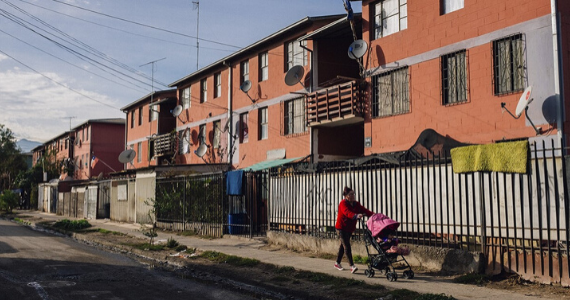RUCAS - Chile
Measuring the impact on well-being and health of dwelling and environmental regeneration in Chile
Social housing and health in urban Chile
In the 1980s, Chile faced a housing crisis that resulted in the construction of large numbers of social housing units for low-income community members. Over time, this housing was revealed to be unable to meet basic and minimum habitability standards. Vulnerable populations in some of the largest cities of the country such as Santiago and Viña del Mar live in these units, where they experience overcrowding, exposure to high levels of humidity and mold, deteriorated sanitary and electrical utilities, lack of noise insulation, lack of sidewalks and access to green space, as well as poor road quality. Additionally, the villas are located in the city’s suburbs with poor access to the city center, limited public transport, weakened communities, and serious problems of crime and drug trafficking.
To address these problems (i.e., the qualitative housing deficit), the Chilean Ministry of Housing and Urban Planning (MINVU) launched the Regeneration of Housing Complexes Program (Programa de Regeneración de Conjuntos Habitacionales) to rejuvenate dwellings and neighborhoods.
MINVU is upgrading existing housing units, constructing new units, and transforming neighborhood environments by installing green spaces, building recreation facilities, repaving streets and sidewalks, and installing new bus stops.
Read the report

The SALURBAL Study
A team of researchers from the Pontifical Catholic University of Chile is working with local partners to evaluate the impacts of this program on general health, respiratory conditions, mental health, and quality of life. This project is known by the name "RUCAS," an acronym for "Urban Regeneration, Quality of Life and Health" (Regeneración Urbana, Calidad de Vida y Salud).
The study is taking place in Brisas del Mar and Nuevo Horizonte II located in the metropolitan area of Viña del Mar, Chile, as well as in the Marta Brunet community within the Santiago Metropolitan area. Both communities were constructed in the 1990s.
Researchers are conducting household surveys, observing changes taking place within the home environment, measuring temperature and humidity levels within homes, conducting semi-structured interviews and focus groups, and documenting the use of recreational areas. These observations are repeated multiple times in each of the two neighborhoods over the course of the study, both before and after interventions are completed. As of early 2021, data has been collected from more than 2,500 individuals living in nearly 1,000 homes in these communities.
The data will be analyzed to determine the impact of the housing and neighborhood interventions. The evidence produced by this study will be disseminated to policy makers so that they can better understand ways to maximize the positive impacts of similar interventions in the future.
COVID19 in the context of vulnerable populations. Social and health impact in the RUCAS cohort*
Following the global outbreak of COVID19, it is proposed to capitalize on the infrastructure of the RUCAS project to evaluate and describe the social and health impact of COVID19 in populations residing in two social housing developments in Chile in the short and medium-term (first winter wave and following summer).
This study aims to estimate, based on informant ́s report, the incidence of COVID19 in the study subjects and family clusters of COVID19; the association between risk factors and disease incidence; ,the mental health impact of COVID19 as well as other health consequences (weight gain, loss of health controls); adherence and barriers to confinement and isolation (quarantine); the impact of the pandemic on employment and socioeconomic situation (income loss, food insecurity, indebtedness); the access to state benefits; and online schooling completion.
The RUCAS-COVID project is nested in waves 4 and 5 of the RUCAS survey, introducing a COVID19 module encompassing 29 questions (adapted from surveys
applied in Chile, internationally, or newly developed by the RUCAS team) . the sanitary conditions, both waves were applied by telephone.
Study Timeline

Partnerships and Collaborators
The RUCAS study team works in close collaboration with the Chilean Ministry of Housing and Urbanism (MINVU), researchers from the Center for Sustainable Development (CEDEUS), and community leaders from the two communities participating in the study. Throughout the project, members of the research team have made more than 20 presentations to community leaders, MINVU representatives and other researchers. These meetings have provided valuable moments of reflection and feedback to ensure that the study is properly implemented to both produce high quality evidence and maintain a high level of relevance to community members and policy makers.
*Project COVID1032 financed by the chilean National Agency for Research and Development (ANID).